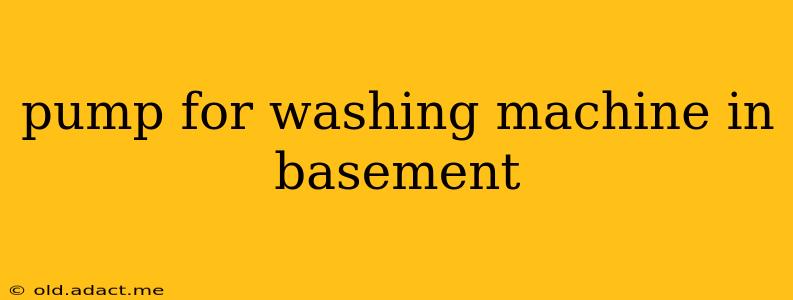Dealing with a washing machine in the basement often involves navigating potential drainage issues. A sump pump or a dedicated laundry pump can be crucial for preventing water damage and ensuring smooth operation. This guide will help you understand the different options and choose the best pump for your specific needs.
What Kind of Pump Do I Need for My Basement Washing Machine?
This is the most common question, and the answer depends on your specific situation. Generally, you have two main options: a sump pump or a laundry pump.
-
Sump Pump: A sump pump is designed to remove accumulated water from a sump pit, a low-lying area in your basement. While it can handle washing machine drainage, it's not its primary function. A sump pump might be sufficient if your basement already has one and experiences occasional water accumulation. However, relying on a sump pump solely for washing machine drainage could overload it and lead to malfunctions.
-
Laundry Pump: A laundry pump is specifically designed to handle the wastewater from washing machines and other laundry appliances. They are typically smaller, more efficient, and better suited for this specific task than a sump pump. They're also usually designed to handle the higher volume of water discharged during a washing machine cycle.
What if My Basement Floods Frequently?
If your basement floods frequently, you'll likely need a more robust solution than just a laundry pump. A powerful sump pump with a backup battery system is highly recommended in this scenario. Consider the potential water volume during a flood to ensure your pump can handle it. You might even benefit from a professional assessment to determine the best drainage solution for your home.
How Powerful of a Pump Do I Need?
The power of the pump, measured in gallons per minute (GPM), depends on the capacity of your washing machine. Consult your washing machine's manual to determine its drainage rate. Choose a pump with a GPM rating that comfortably exceeds this drainage rate to prevent backups. Overestimating is always safer than underestimating in this situation.
What About Automatic Shut-Off Features?
Many modern pumps incorporate automatic shut-off features that prevent the pump from running dry or overheating. These features significantly extend the pump's lifespan and enhance safety. Look for models with automatic shut-off capabilities when making your purchase. This is a worthwhile investment for peace of mind and longevity.
Where Should I Install the Pump?
The optimal location for your pump depends on the type of pump and your basement's layout. Laundry pumps are typically installed near the washing machine, with the discharge hose connected directly to the drain line. Sump pumps are installed in the sump pit itself. Always consult with a qualified plumber if you're unsure about the ideal installation location. Improper installation can void warranties and lead to malfunctions.
Can I Install the Pump Myself?
While some individuals are comfortable with DIY projects, installing a pump incorrectly can lead to water damage and other problems. If you're not confident in your plumbing skills, it's best to hire a licensed plumber to ensure proper installation and prevent future complications. The cost of professional installation is a small price to pay compared to the potential cost of water damage repair.
How Much Does a Washing Machine Pump Cost?
The price of a washing machine pump (laundry pump or sump pump upgrade) varies widely depending on the brand, features, and horsepower. You can find basic models for a relatively low cost, while more advanced pumps with additional features, like battery backups, will be more expensive. Consider your budget and the specific needs of your situation when selecting a pump.
By carefully considering these factors, you can select the ideal pump to protect your basement and your washing machine from water damage. Remember, consulting with a professional plumber can provide valuable insights and ensure the proper installation of your chosen pump.
